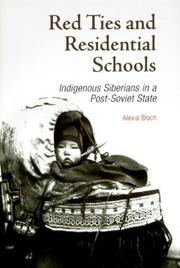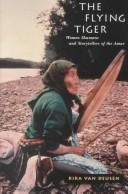| Listing 1 - 4 of 4 |
Sort by
|
Book
ISBN: 9150600648 Year: 1976 Publisher: Uppsala Tofters
Abstract | Keywords | Export | Availability | Bookmark
 Loading...
Loading...Choose an application
- Reference Manager
- EndNote
- RefWorks (Direct export to RefWorks)
Bears --- -Evenki (Asian people) --- Avanki (Asian people) --- Avankil (Asian people) --- Chapogir (Asian people) --- Ewenki (Asian people) --- Khamnigan (Asian people) --- O-wen-kʻo (Tribe) --- Owenke (Asian people) --- Owenko (Asian people) --- Tungus (Asian people) --- Tunguses --- Arctic peoples --- Ethnology --- Tungusic peoples --- Ursidae --- Carnivora --- Religious aspects --- Rites and ceremonies. --- Evenki (Asian people) --- Religious aspects. --- Rites and ceremonies
Book
ISBN: 9004254234 9789004254237 9789004233065 9004233067 Year: 2013 Publisher: Leiden Boston Global Oriental
Abstract | Keywords | Export | Availability | Bookmark
 Loading...
Loading...Choose an application
- Reference Manager
- EndNote
- RefWorks (Direct export to RefWorks)
Evenki are modern hunter-gatherers who live in Central and Eastern Siberia, Russian Federation. They are known to scholarship for their animistic worldview, and because the word ‘shaman’ has been borrowed from their language. Despite such recognition contemporary Evenki everyday life rarely appears as a subject for anthropological monographs, mainly because access to Evenki communities for the purpose of extended fieldwork has only recently become possible. In this original study of the Evenki the authors describe a variety of events and situations they observed during fieldwork, and through these experiences document different strategies that Evenki use to retain their ethos as hunter-gatherers even in circumstances when hunting is prohibited. The authors adopt the vocabulary of cybernetics, proposed by anthropologist Gregory Bateson, in order to underline the circuit logic of events that happen in Evenki land. Culture Contact in Evenki Land , therefore, will be welcomed by social anthropologists in general and specialists of Siberian and Inner Asian studies (Manchu-Tungus peoples) and hunter-gatherer peoples in particular, as well as those interested in the cybernetic approach.
Evenki (Asian people) --- SOCIAL SCIENCE / Anthropology / Cultural. --- SOCIAL SCIENCE / Discrimination & Race Relations. --- SOCIAL SCIENCE / Ethnic Studies / General. --- SOCIAL SCIENCE / Minority Studies. --- Avanki (Asian people) --- Avankil (Asian people) --- Chapogir (Asian people) --- Ewenki (Asian people) --- Khamnigan (Asian people) --- O-wen-kʻo (Tribe) --- Owenke (Asian people) --- Owenko (Asian people) --- Tungus (Asian people) --- Tunguses --- Arctic peoples --- Ethnology --- Tungusic peoples --- Baikal, Lake, Region (Russia) --- Social life and customs.

ISBN: 9780812237597 0812237595 0812293622 Year: 2004 Publisher: University of Pennsylvania Press
Abstract | Keywords | Export | Availability | Bookmark
 Loading...
Loading...Choose an application
- Reference Manager
- EndNote
- RefWorks (Direct export to RefWorks)
In this book Alexia Bloch examines the experiences of a community of Evenki, an indigenous group in central Siberia, to consider the place of residential schooling inidentity politics in contemporary Russia. Residential schools established in the 1920s brought Siberians under the purview of the Soviet state, and Bloch demonstrates how in the post-Soviet era, a time of jarring social change, these schools continue to embody the salience of Soviet cultural practices and the spirit of belonging to a collective. She explores how Evenk intellectuals are endowing residential schools with new symbolic power and turning them into a locus for political mobilization.In contrast to the binary model of oppressed/oppressor underlying many accounts of state/indigenous relations, Bloch's work provides a complex picture of the experiences of Siberians in Soviet and post-Soviet society. Bloch's research, conducted in a central Siberian town during the 1990s, is ethnographically grounded in life stories recorded with Evenk women; surveys of households navigating histories of collectivization and recent, rampant privatization; and in residential schools and in museums, both central to Evenk identity politics.While considering how residential schools once targeted marginalized reindeer herders, especially young girls, for socialization and assimilation, Bloch reveals how class, region, and gendered experience currently influence perspectives on residential schooling. The analysis centers on the ways vehicles of the Soviet state have been reworked and still sometimes embraced by members of an indigenous community as they forge new identities and allegiances in the post-Soviet era.
Evenki (Asian people) --- Ethnology --- Evenk (Peuple d'Asie) --- Anthropologie sociale et culturelle --- Education --- Avanki (Asian people) --- Avankil (Asian people) --- Chapogir (Asian people) --- Ewenki (Asian people) --- Khamnigan (Asian people) --- O-wen-kʻo (Tribe) --- Owenke (Asian people) --- Owenko (Asian people) --- Tungus (Asian people) --- Tunguses --- Arctic peoples --- Tungusic peoples --- Cultural anthropology --- Ethnography --- Races of man --- Social anthropology --- Anthropology --- Human beings --- History. --- Anthropology. --- Education. --- Folklore. --- Linguistics.

ISBN: 1282859129 9786612859120 0773569006 9780773569003 0773521550 0773521569 9780773521551 9780773521568 Year: 2001 Volume: 26 Publisher: Montreal: McGill-Queen's university press,
Abstract | Keywords | Export | Availability | Bookmark
 Loading...
Loading...Choose an application
- Reference Manager
- EndNote
- RefWorks (Direct export to RefWorks)
Describes the lives of the people of the Amur during a period of dramatic transition, as they attempt to find some way to relate ancient traditions to an uncertain future. The author emphasizes the contributions of women in traditional and contemporary society, and their concerns with ecology and the education of children.
Tales --- Women storytellers --- Women shamans --- Evenki (Asian people) --- Femmes chamans --- Toungouses --- Légendes --- Contes --- Avanki (Asian people) --- Avankil (Asian people) --- Chapogir (Asian people) --- Ewenki (Asian people) --- Khamnigan (Asian people) --- O-wen-kʻo (Tribe) --- Owenke (Asian people) --- Owenko (Asian people) --- Tungus (Asian people) --- Tunguses --- Arctic peoples --- Ethnology --- Tungusic peoples --- Medicine women --- Shamanesses --- Shamans --- Storytellers --- Women entertainers --- Folk tales --- Folktales --- Folk literature --- Conteuses --- Evenk (Peuple d'Asie) --- Folklore. --- Folklore --- Tales - Amur River Valley (China and Russia) --- Women storytellers - Amur River Valley (China and Russia) --- Women shamans - Amur River Valley (China and Russia) --- Evenki (Asian people) - Folklore --- Legendes
| Listing 1 - 4 of 4 |
Sort by
|

 Search
Search Feedback
Feedback About UniCat
About UniCat  Help
Help News
News